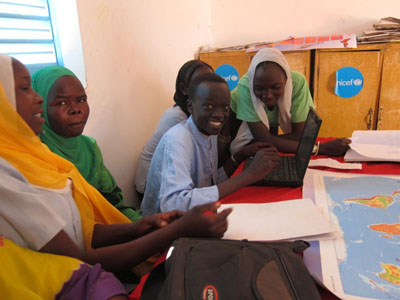
It takes us five days from when we leave Los Angeles to arrive in a refugee camp in eastern Chad. We go from big plane, to medium, to small, to smaller. This is remote. Our i-ACT team is excited to make the journey with the mission of implementing the technology component of the Darfur Dream Team Sister Schools Program, connecting schools in Djabal refugee camp with schools in the United States.

When we arrive at Djabal, just before sunset, we are welcomed as if we're returning home—word gets out fast! We have to leave within the hour, but before I get in the car, I hear, "Gabriel." Our good friend Rahma, a bright seventh grader, is there with his huge smile. This is our fifth trip to the camp, and spending time with Rahma is one of the highlights.
When walking through the camp and having conversations with refugees about our lives, it is sometimes easy to forget that the people here have experienced extreme violence and lost so much. Many of the children have seen things no child should ever witness. The horrors in their past is not helped by the uncertainty in their future. With all of these uncertainties and challenges in their past, present, and future, it is always surprising that, when asked about what they value the most and where they find hope, their answer is always: “Education!”
The beauty of the Sister Schools Program concept is that it creates a mutually beneficial relationship in which students learn from each other and expand their horizons. Schools in the United States engage in creative fundraising efforts to support their sister schools in the camps, but the program also allows students and communities halfway across the world to connect with the refugees at a very personal level, sharing information about their daily lives and becoming friends.
We already are seeing some of the results from the relationships. Two of the schools in Djabal have new classrooms, made of concrete blocks with concrete floors and doors and windows that actually lock. There are blackboards on the walls and desks are arriving soon, while much-needed teacher training and textbook purchases have taken place. And much more is being planned. There is already construction underway to complete more of these classrooms, with the end goal of completely renovating all six schools in Djabal.
Our current trip is ambitious. Even after we leave Djabal, a place with no infrastructure and a population with no experience in online technology, the refugee students and teachers will be able to connect to U.S. students through a simplified online social network. We've started using the technology "Commkit” with the refugee students and they are having a blast learning how to connect—from the basics of using a keyboard, to the idea of sending messages up through a satellite and down onto another continent. What we've seen is that the young Darfuris, just like young Americans, are eager and able to quickly take on the new technology in an almost organic way.
You can follow and participate in our current i-ACT Expedition to Djabal and Goz Amer refugee camps by visiting either the Darfur Dream Team website and Facebook page or the i-ACT website and Facebook page. Once you meet the people of the camps, I know that you will want to keep the conversation going. Katie-Jay, James, and I feel privileged to be able to visit the refugees and work with them on this program. Our team back home is amazing in keeping us connected. I hope that you're able to experience some of what we experience on this side.
Gabriel Stauring is the Co-Founder and Director of i-ACT, an advocacy organization that harnesses the power of video and the internet. They are currently in eastern Chad, visiting Darfuri refugee camps to reconnect with refugees and bring their stories back to the United States on behalf of Enough's Darfur Dream Team Sister Schools Program.

